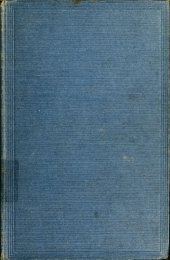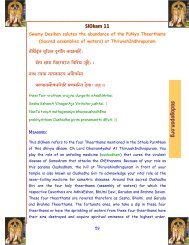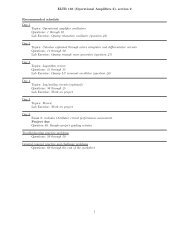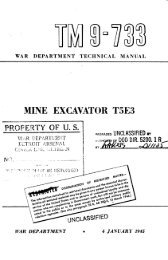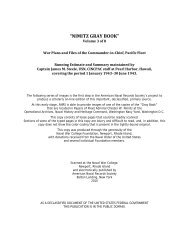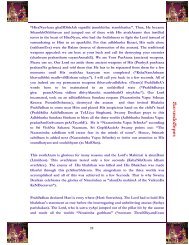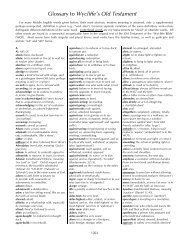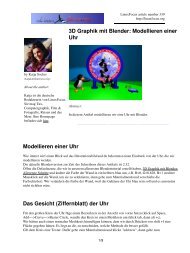You also want an ePaper? Increase the reach of your titles
YUMPU automatically turns print PDFs into web optimized ePapers that Google loves.
CHAPTER 13<br />
13.1 In the meantime let us not forget the Prince of Athens and the Lady Iduna. These adventurous<br />
companions soon lost sight of their devoted champion, and entered a winding ravine, which gradually<br />
brought them to the summit of the first chain of the Epirot mountains. From it they looked down upon a<br />
vast and rocky valley, through which several mule tracks led in various directions, and entered the highest<br />
barrier of the mountains, which rose before them covered with forests of chestnut and ilex. Nicæus chose<br />
the track which he considered least tempting to pursuit, and towards sunset they had again entered a<br />
ravine washed by a mountain stream. The course of the waters had made the earth fertile and beautiful.<br />
Wild shrubs of gay and pleasant colours refreshed their wearied eye-sight, and the perfume of aromatic<br />
plants invigorated their jaded senses. Upon the bank of the river, too, a large cross of roughly-carved<br />
wood brought comfort to their Christian hearts, and while the holy emblem filled them with hope and<br />
consolation, and seemed an omen of refuge from their Moslemin oppressors, a venerable Eremite, with a<br />
long white beard descending over his dark robes, and leaning on a staff of thorn, came forth from an<br />
adjoining cavern to breathe the evening air and pour forth his evening orisons.<br />
13.2 Iduna and Nicæus had hitherto prosecuted their sorrowful journey almost in silence. Exhausted<br />
with anxiety, affliction, and bodily fatigue, with difficulty the daughter of Hunniades could preserve her<br />
seat upon her steed. One thought alone interested her, and by its engrossing influence maintained her<br />
under all her sufferings, the memory of Iskander. Since she first met him, at the extraordinary interview in<br />
her father's pavilion, often had the image of the hero recurred to her fancy, often had she mused over his<br />
great qualities and strange career. His fame, so dangerous to female hearts, was not diminished by his<br />
presence. And now, when Iduna recollected that she was indebted to him for all that she held dear, that<br />
she owed to his disinterested devotion, not only life, but all that renders life desirable, honour and<br />
freedom, country and kindred, that image was invested with associations and with sentiments, which, had<br />
Iskander himself been conscious of their existence, would have lent redoubled vigour to his arm, and<br />
fresh inspiration to his energy. More than once Iduna had been on the point of inquiring of Nicæus the<br />
reason which had induced alike him and Iskander to preserve so strictly the disguise of his companion.<br />
But a feeling which she did not choose to analyse struggled successfully with her curiosity: she felt a<br />
reluctance to speak of Iskander to the Prince of Athens. In the meantime Nicæus himself was not<br />
apparently very anxious of conversing upon the subject, and after the first rapid expressions of fear and<br />
hope as to the situation of their late comrade, they relapsed into silence, seldom broken by Nicæus, but to<br />
deplore the sufferings of his mistress, lamentations which Iduna answered with a faint smile.<br />
13.3 The refreshing scene wherein they had now entered, and the cheering appearance of the<br />
Eremite, were subjects of mutual congratulation; and Nicæus, somewhat advancing, claimed the attention<br />
of the holy man, announcing their faith, imprisonment, escape, and sufferings, and entreating hospitality<br />
and refuge. The Eremite pointed with his staff to the winding path, which ascended the bank of the river<br />
to the cavern, and welcomed the pilgrims, in the name of their blessed Saviour, to his wild abode and<br />
simple fare.<br />
13.4 The cavern widened when they entered, and comprised several small apartments. It was a<br />
work of the early Christians, who had found a refuge in their days of persecution, and art had completed<br />
the beneficent design of nature. The cavern was fresh, and sweet, and clean. Heaven smiled upon its<br />
pious inmate through an aperture in the roof; the floor was covered with rushes; in one niche rested a<br />
brazen cross, and in another a perpetual lamp burnt before a picture, where Madonna smiled with meek<br />
tenderness upon her young divinity.<br />
13.5 The Eremite placed upon a block of wood, the surface of which he had himself smoothed,<br />
some honey, some dried fish and a wooden bowl filled from the pure stream that flowed beneath them: a<br />
simple meal, but welcome. His guests seated themselves upon a rushy couch, and while they refreshed<br />
themselves, he gently inquired the history of their adventures. As it was evident that the Eremite, from<br />
her apparel, mistook the sex of Iduna, Nicæus thought fit not to undeceive him, but passed her off as his<br />
brother. He described themselves as two Athenian youths, who had been captured while serving as<br />
volunteers under the great Hunniades, and who had effected their escape from Adrianople under<br />
circumstances of great peril and difficulty; and when he had gratified the Eremite's curiosity respecting<br />
their Christian brethren in Paynim lands, and sympathetically marvelled with him at the advancing<br />
fortunes of the Crescent, Nicæus, who perceived that Iduna stood in great need of rest, mentioned the<br />
fatigues of his more fragile brother, and requested permission for him to retire. Whereupon the Eremite<br />
himself, fetching a load of fresh rushes, arranged them in one of the cells, and invited the fair Iduna to<br />
28




